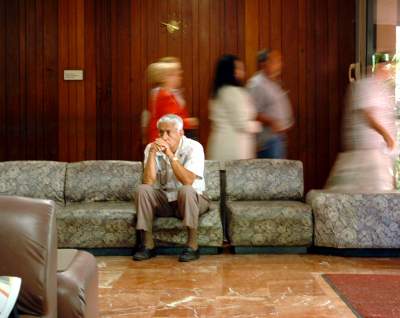
Women diagnosed with breast cancer undergo tremendous stress. It’s only natural and expected. But recent research has found that husbands of women affected with breast cancer suffer too—caring for the wife takes a toll on the man’s health, even years after cancer the diagnosis and treatment.
Men who reported the highest levels of stress in relation to their wives’ cancer were at the highest risk for physical symptoms and weaker immune responses, the study showed.
The researchers found that how stressed a man is about his wife’s condition has a bigger influence on his health than his wife’s actual condition.
The researchers feel that clinicians caring for the breast cancer patient should also take the spouse’s health and offer screening for symptoms of stress. The husbands would benefit from stress management, relaxation or other self-care activities, according to Sharla Wells-Di Gregorio, lead author of the study and assistant professor of psychiatry and psychology at Ohio State University.
“If you care for the caregiver, your patient gets better care, too,” said Kristen Carpenter, a postdoctoral researcher in psychology at Ohio State and a study co-author.
The research is published in a recent issue of the journal Brain, Behavior and Immunity.
The study found that men whose wives experience a recurrence of cancer are more stressed. They are more fatigued and show physical symptoms, such as headaches and abdominal pain, gastrointestinal problems, coughing and nausea than men whose wives remain disease-free.
The subjective stress assessment used in the study, called the Impact of Events Scale, measures intrusive experiences and thoughts, as well as attempts to avoid people and places that serve as painful reminders. The scale produces a score between 0 and 75. And the higher the score, the higher the stress. It was found that men whose wives’ cancer had recurred scored 26.25 as a group, and men whose wives were disease-free scored 8.94. According to the scale, scores above nine suggest a likely effect from the events, and scores between 26 and 43 indicate an event has had a powerful effect on a person’s stress level. Scores over 33 suggest clinically significant distress.
“Guilt, depression, fear of loss—all of those things are stressful. And this is not an acute stressor that lasts a few weeks. It’s a chronic stress that lasts for years,” Carpenter said.
When the analysis took into consideration the impact of men’s perceived stress in relation to their wives’ cancer, higher stress was associated with compromised immune function: Specifically, men with the highest scores on the stress scale also showed the lowest immune responses to two of the three antigens. Previous research has suggested that people with an impaired immune response are more susceptible to infection and might not respond well to vaccines.
“Caregivers are called hidden patients because when they go in for appointments with their spouses, very few people ask how the caregiver is doing,” said Wells-Di Gregorio, who works in Ohio State’s Center for Palliative Care. “These men are experiencing significant distress and physical complaints, but often do not seek medical care for themselves due to their focus on their wives’ illness.”
In these men undergoing chronic stress, the researchers said that it remains unclear whether the immune dysregulation causes more physical symptoms, or stress causes the symptoms and the impaired immune response.

